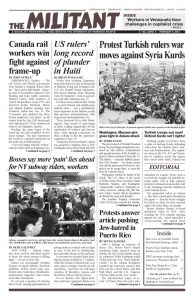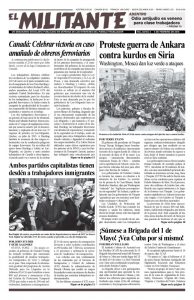This year’s ‘Women’s Marches’ on the weekend of Jan. 20-21 drew hundreds of thousands of participants in cities and towns throughout the U.S. and around the world. But march organizers failed to present a road forward to meet the social and political crisis facing working people.
Their central message is that President Donald Trump is the reason for all the problems women and others face today, and they promote backing the Democratic Party in the 2018 elections.
The actions were also marked by social issues, especially the revelations about men in positions of power — bosses, politicians, casting directors and others — abusing and sexually harassing women. This is something that has long been known, but before now seldom talked about in public. Participants also spoke out about attacks on women’s right to choose abortion and contraception, opposition to deportations of immigrant workers and students, and many other questions.
“There’s greater consciousness about the common obstacles that women face,” Julianne McShane, 23, from New York University said at the march in that city. “Because of that there’s also more conversation around how to overcome them.”
Members and supporters of the Socialist Workers Party across the country joined the marches, armed with tables full of books by party leaders, Fidel Castro, Thomas Sankara, Karl Marx, Evelyn Reed and other revolutionary leaders, as well as the Militant. We went to discuss and debate a working-class course forward in the fight against capitalist rule.
We explained that working people today face a deep moral and political crisis brought about by the workings of the dog-eat-dog capitalist system. The only road out is to fight to unify the working class and build an independent working-class movement, break from the Democrats, Republicans and all the “independent” capitalist reformers who will come forward, and take political power into our own hands.
We pointed to the example of the Cuban Revolution, where workers and farmers took power in 1959, reorganized society in the interests of the vast majority and reached out the hand of solidarity to workers worldwide.
Party members discuss these same questions every week, knocking on doors in working-class neighborhoods in cities and towns across the country to introduce the party and its program.
Dan Fein writes from Chicago that the SWP there put up a number of signs on their table, including one that said, “Break with the Democrats and Republicans.” Christy Whitney, a teacher, saw it and stopped to talk.
“Our union just endorsed the Democrats,” she said. “I spoke against them saying they were not on our side.” She wanted to learn more about the Cuban Revolution and took information on the May Day Brigade being organized for people in the U.S. and elsewhere to go see the revolution for themselves.
She picked up a subscription to the Militant and Feminism and the Marxist Movement by SWP leader Mary-Alice Waters.
In New York there will be a tour by Griselda Aguilera, who at the age of 7 was the youngest of the tens of thousands of volunteers who led the Cuban Revolution’s 1961 literacy campaign. SWP members and others got out flyers for her Feb. 10 citywide meeting.
Party members sold two copies of Women in Cuba: The Making of a Revolution Within the Revolution by Vilma Espín, Asela de Los Santos and Yolanda Ferrer. The book explains how Cuban working people were transformed in the course of making their revolution, becoming capable of taking power and running the country themselves.
We also sold copies of Are They Rich Because They’re Smart? by SWP National Secretary Jack Barnes; Is Socialist Revolution in the US Possible? by Mary-Alice Waters; and The Communist Manifesto by Karl Marx and Frederick Engels.
In Ventura, California, near the area where recent wildfires and mudslides killed dozens of people, some 1,500 people marched. Many nodded in agreement at the sign at the SWP table, “Social disaster in mudslide is result of capitalist rule.”
SWP members in Seattle staffed a busy party book table at the assembly point of the march, discussing politics and telling people about the May Day Brigade to Cuba.
Lauren Evans, a mechanic in the Navy, joined the action after meeting the party at a Martin Luther King Jr. Day celebration. She said she “is processing who is to blame for the conditions and how things can change.”
Bernie Senter and Edwin Fruit contributed to this article.

